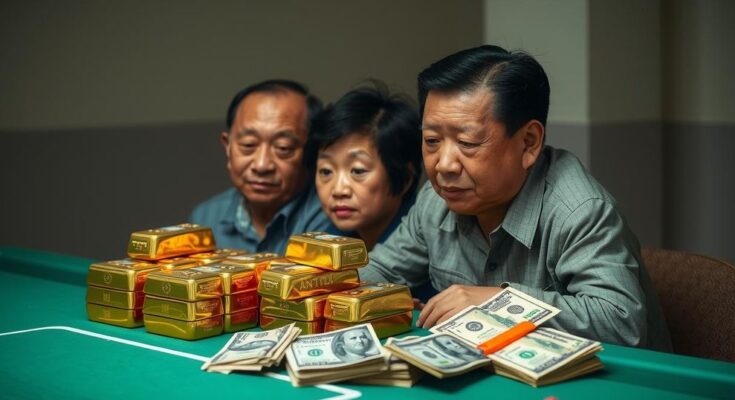Three Chinese nationals were arrested in eastern DR Congo with 12 gold bars and $800,000 in cash, concealed in a vehicle. This operation occurred in response to escalating illegal mining concerns. The region’s resources have been historically exploited, leading to corruption and conflict. The arrests highlight ongoing efforts to address illegal mining and the role of foreign interests in the region’s instability.
In a significant bust in the Eastern Democratic Republic of Congo, three Chinese nationals were apprehended with 12 gold bars and $800,000 in cash concealed under their vehicle seats. The South Kivu province governor, Jean Jacques Purusi, indicated that the operation was conducted quietly due to concerns following the previous release of another group of Chinese detainees linked to illegal mining activities. Eastern DR Congo is rich in precious minerals such as gold and diamonds, which have historically been exploited by foreign entities, resulting in ongoing regional conflicts.
Militia factions exert control over many mining operations, profiting from the sale of these minerals to intermediaries, some of whom maintain strong connections with influential figures in Kinshasa. The recent arrests were initiated after receiving a tip-off, leading authorities to a thorough vehicle search in the Walungu region, although the exact quantity of gold discovered remains undisclosed. The previous month, there was considerable public outrage following the release of 17 other Chinese nationals arrested for running an illegal gold mine, as this not only complicated the efforts to reform the country’s corrupt mineral sector but also resulted in substantial unpaid taxes totaling $10 million owed to the national government.
Furthermore, tensions escalate in the neighboring North Kivu province where a Rwandan-backed insurgent group has gained significant territory, and the Congolese government is currently pursuing legal action against Apple regarding the sourcing of conflict minerals, emphasizing that such operations finance militia violence and contribute to severe human rights violations. Notably, the Rwandan government has dismissed allegations of facilitating illegal mineral exports from DR Congo.
The Democratic Republic of Congo possesses an abundance of invaluable resources, including gold, diamonds, and crucial minerals utilized in contemporary technology. However, this mineral wealth has led to exploitation by various foreign entities since the era of colonialism, fostering chronic instability in the region for over three decades. Control over mining operations has often fallen into the hands of local militia groups, which in turn finance their activities through relationships with middlemen, often connected to powerful elites in the capital. This situation has prompted multiple initiatives to regulate the extraction and sale of these resources, although progress remains slow amid ongoing corruption and conflict.
The arrest of the three Chinese nationals represents a pivotal enforcement action in the ongoing struggle to regulate illegal mining within the Democratic Republic of Congo. The situation underscores the difficulties faced by authorities in combatting the intertwining of mineral exploitation with corruption and conflict. Moving forward, meaningful reform in the region’s mining sector will require concerted efforts both locally and internationally, particularly in addressing the intricate supply chains that facilitate the illegal mineral trade.
Original Source: www.bbc.co.uk




